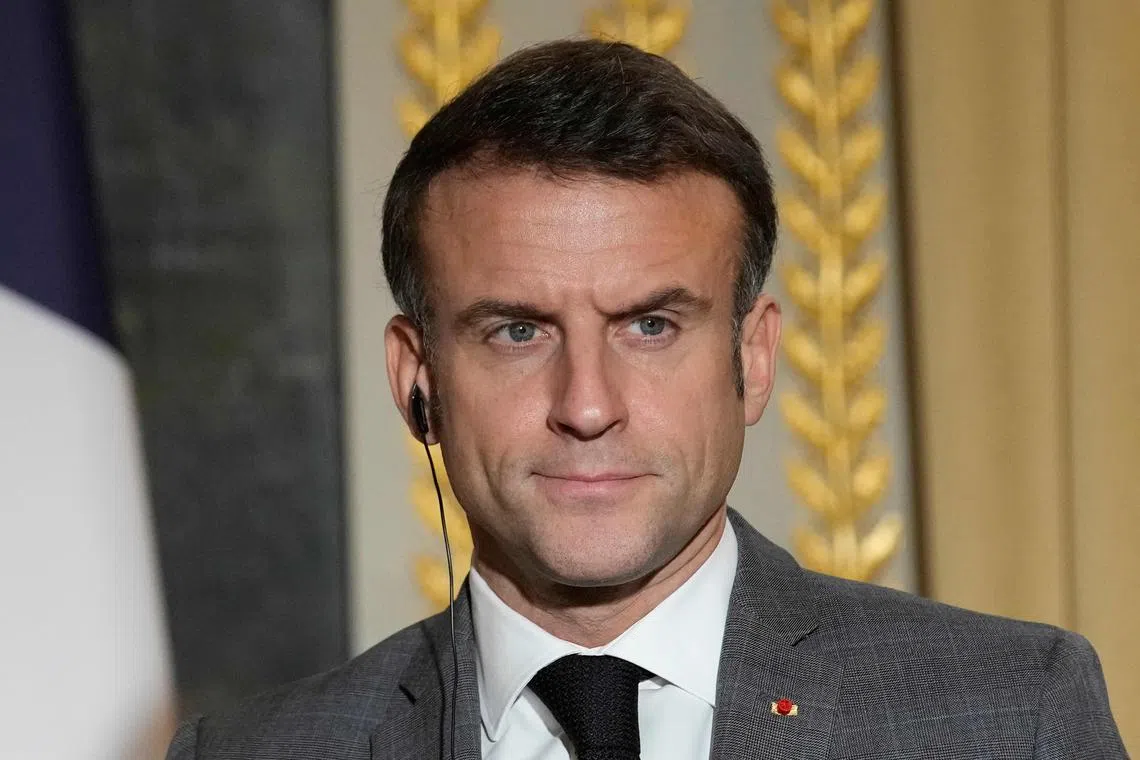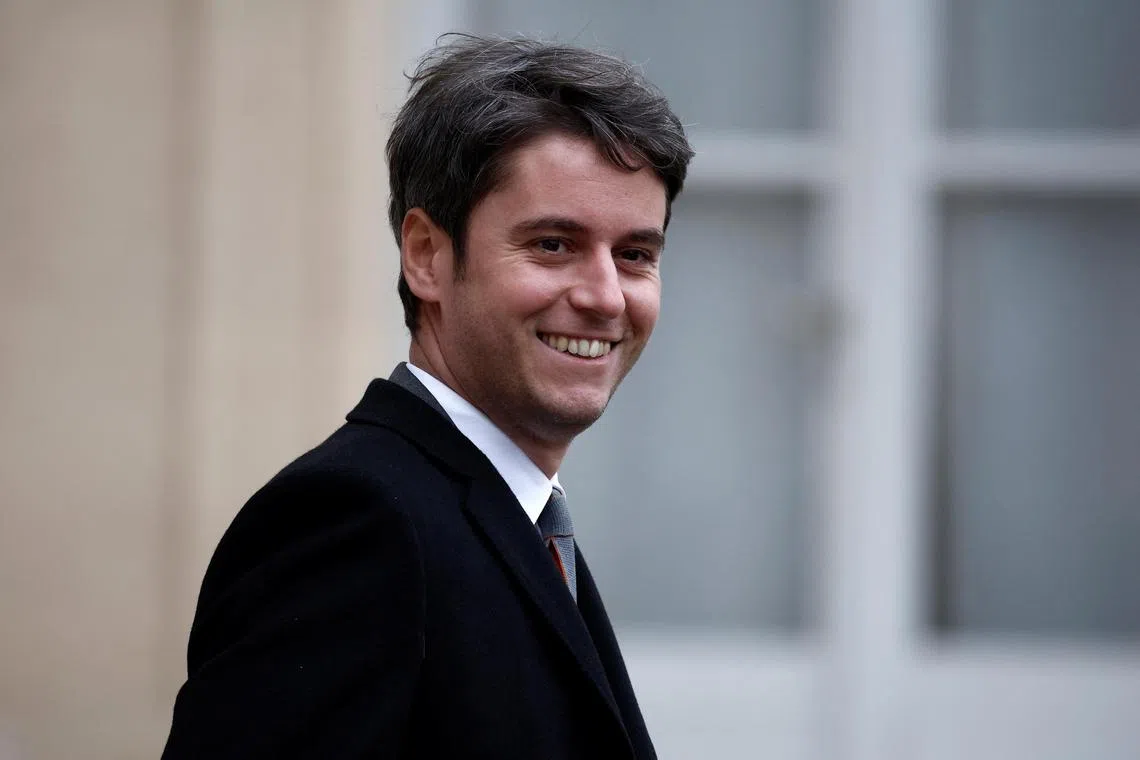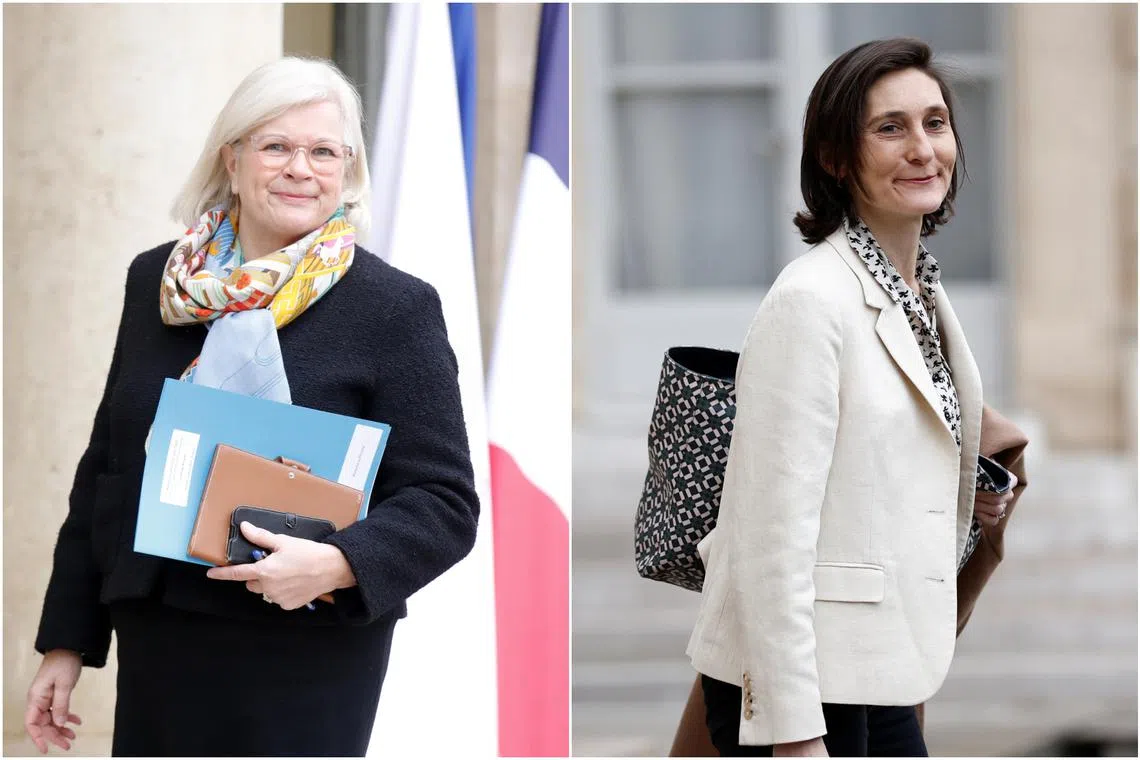French president Macron demands ‘revolutionary’ government but few new faces emerge
Sign up now: Get ST's newsletters delivered to your inbox

The men clinging fast to the great offices of state have also meant immediate blasts at Mr Emmanuel Macron for failing to consider women.
PHOTO: AFP
PARIS - French President Emmanuel Macron on Jan 12 asked ministers to be “revolutionaries”, after a government reshuffle that left many of the same faces in place and raised doubts over gender equity and policy priorities.
“I don’t want ministers who administer, I want ministers who act,” Mr Macron told the first Cabinet meeting under France’s youngest-ever Prime Minister Gabriel Attal,
“I don’t want managers, I want revolutionaries”, he said.
Naming the young, articulate Mr Attal to the premiership and freshening the ministerial roster is a bid by Mr Macron to breathe new life into his flagging second term, hobbled by the lack of an absolute majority in Parliament.
But many of the people sitting around the Cabinet table for the new government’s first weekly meeting on Jan 12 were still firmly in the same seats as before the change.
Finance Minister Bruno Le Maire, Interior Minister Gerald Darmanin, Justice Minister Eric Dupond-Moretti and Defence Minister Sebastien Lecornu remained in place.
“Macron has managed to make a spectacular show with a team that at its core looks very much like the previous one,” conservative daily Le Figaro wrote.
“The new prime minister would doubtless have liked to go further with renewing the team.”
“Why would Macron give up his bosses when they could do him harm from the outside?“ the left-leaning Liberation commented.
The men clinging fast to the great offices of state have also meant immediate blasts at Mr Macron for failing to consider women.
“Equality between women and men must also be expressed in the heart of sovereign power,” said departing foreign minister Catherine Colonna – replaced by a man, long-time Macron supporter Stephane Sejourne.
He was in a civil partnership with Mr Attal, France’s first openly gay prime minister, but their relationship is now believed to be over.

Newly-appointed French PM Gabriel Attal leaves after the first weekly Cabinet meeting following a government reshuffle at the Elysee Palace in Paris, on Jan 12.
PHOTO: REUTERS
Mr Macron has since his first election in 2017 named female ministers to the justice, defence and foreign affairs briefs, as well as former prime minister Elisabeth Borne.
But now women have instead been confined to “gendered ministries”, Women’s Foundation president Anne-Cecile Mailfert said.
Ms Catherine Vautrin, a former supporter of conservative president Nicolas Sarkozy, will head a super-ministry spanning health, labour and solidarity.
Ms Amelie Oudea-Castera has had the education and youth briefs bolted on to her former responsibility for sport, just months ahead of the Summer Olympic Games in Paris.

Minster of Health, Labour and Solidarity Catherine Vautrin (left) and Minister of Education, Youth, Sports, Olympic and Paralympic Games Amelie Oudea-Castera arrive at the Elysee palace for the first new Cabinet meeting, in Paris on Jan 12.
PHOTOS: EPA-EFE, REUTERS
And another poached conservative figure, Ms Rachida Dati, will head the culture ministry.
Speaking as she took over the job, Ms Dati – who has Moroccan-Algerian roots – said on Jan 12 that French culture bestowed on her “the freedom to think, the freedom to speak, the freedom to create, especially for women”.
Nevertheless, the new team is “a very masculine government where women are losing ground”, socialist senator Laurence Rossignol said.
Mr Macron’s perceived snub to women has followed outcry from feminists over his defence of Mr Gerard Depardieu, saying multiple sexual assault allegations had subjected the legendary actor to a “manhunt”.
Even Mr Macron’s own wife Brigitte has since stressed “the importance of women’s voices”.
The two “super-ministries” headed by Ms Vautrin and Ms Oudea-Castera have also raised questions about how much attention will be paid to France’s strained health and education systems.
“Is this nomination a sign that health is an important subject that deserves a big ministry, or is it a sign that it doesn’t deserve a ministry of its own?“ asked Dr Agnes Giannotti, president of major doctors’ union MG France.
Health appears “relegated to the background”, said Mr Patrick Gasser, president of another doctors’ union, Avenir Spe.
“I don’t believe that this is a picture of boldness and transformation”, he added.
Ms Vautrin herself said that “public hospitals and all health institutions must be supported as well as modernised”, hailing the “courage” of medical staff and calling for them to have “stimulating working conditions”.
Ms Oudea-Castera said there would be “many synergies” between her slew of portfolios and vowed to “keep up the work” of Mr Attal, who promised blockbuster reforms in the five months he spent at education before becoming prime minister.
But Ms Sophie Venetitay, head of the major middle and high school teachers’ union Snes-FSU, said that she would be a “part-time minister” on one of the most sensitive briefs in government. AFP


